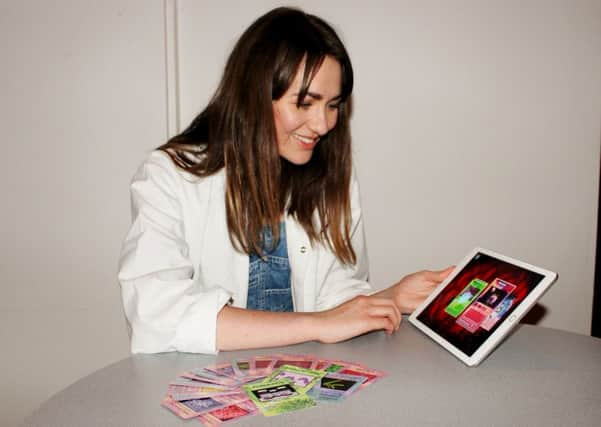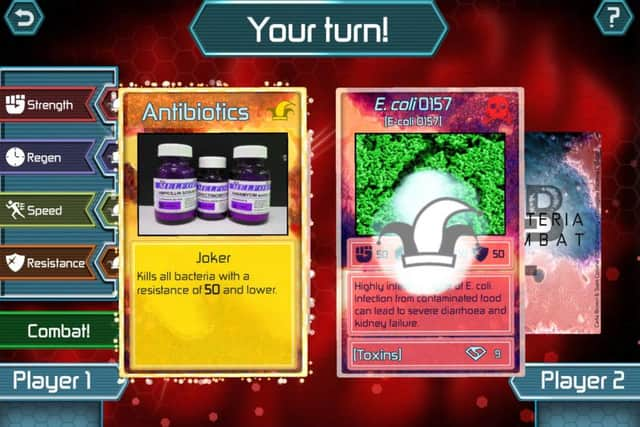App to teach children about antibiotic resistance


Carla Brown, a PHD student at the University of Glasgow, has teamed up with Dundee based game developers Future Fossil Studios to educate children on different types of bacteria.
Bacteria Combat is a digital card battle game including good and bad bacteria and antibiotic cards
Advertisement
Hide AdAdvertisement
Hide AdThe app will be released on November 1st on Google Play and App store and Carla Brown hopes it will be used widely in schools across Scotland.


She said: “I carried out my PhD at the University of Glasgow and my research focused on the development of new antibiotics produced by gut bacteria, which may be able to combat the massive problem of antibiotic resistance.
“I wanted to develop a fun but educational game which would demonstrate the importance of our ‘friendly bugs’ while highlighting the problem of antibiotic resistance.”
“Another potential solution to the problem of resistance is better education of the public on the specific role of antibiotics, i.e not to be used for the flu and colds, I believe that by educating school pupils on this topic, they will form attitudes that will be maintained throughout life.
Bacteria Combat is a Top Trumps-style game aimed at players aged between eight and 13. Players are given cards representing a wide range of ‘friendly’ and ‘dangerous’ bacteria. They face off against a computer-controlled player, The Bacteria Bot, by pitting their bacteria’s strength, regeneration, speed and resistance scores against each other, with the highest scores winning the round.
Each card also provides a picture of the bacteria and a short description oftheir characteristics, helping players to learn more about the world of bacteria. ‘Joker’ cards representing antibiotics can also help to banish bad bacteria and win the round.
Behind the fun gameplay, however, is a serious message. Widespread misuse and overuse of antibiotic medications in human and animals over decades has led to the problem of antibiotic resistance, where microbes become less affected by medications which have proved successful in improving health in the past. This has led to a dwindling supply of effective antimicrobial therapies.
Disruption of beneficial gut bacteria via increased antibiotic exposure in childhood is also linked to the development of asthma, obesity, autism and inflammatory bowel disease.
Advertisement
Hide AdAdvertisement
Hide AdCarla said: “To ensure new classes of antibiotics are used effectively we must also improve public awareness on the specific role of antibiotics against bacteria and also the emerging problem of resistance.
“If abused or misused, this type of antibiotic can promote antibiotic resistance which is severely undermining the effectiveness of these drugs today. These health topics are ineffectively communicated to the public and often inaccurately described by the media.
“I value the use of alternative, sustainable and motivational teaching resources which are accessible to all classrooms. I believe that the ‘gamification’ of science can make difficult topics much easier to grasp.
“If antibiotic resistance is not tackled effectively we are at threat of a ‘post-antibiotic era’ in which minor infections and surgeries could prove fatal.
Education of the public will be an extremely important factor in tackling this problem. It is important that we encourage the public to feel more confident about controlling their own health care. Science games will be a great method for this”.
Distribution of the card game and development of the app were funded by University of Glasgow, the Society for Applied Microbiology, e-Bug, Microbiology Society, the Royal Society of Biology and the Biochemical Society.
“We will also be launching the game at Dundee science festival on 3 November. We hope this will demonstrate the success which comes from scientists collaborating with game developers,” she added.